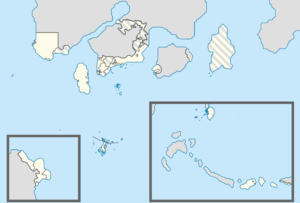Springwind Islands
| Springwind Islands Kepulauan Springwind |
|||
|---|---|---|---|
| City and Territorial capital | |||
| Collectivity of the Springwind Islands Jajahan Kepulauan Springwind |
|||
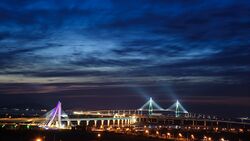 |
|||
|
|||
| Country | |||
| Entity | Free area of the Federation | ||
| Territory | |||
| Proclamation of Nahyou sovereignty (Annexation) |
6 June -16BP | ||
| Incorporated | 1 January -6BP | ||
| Springwind Islands sexual assault trial | RP 2600 | ||
| Springwind Islands riots | RP 2600 | ||
| Straits Settlements referendum | 20 November RP 2600 | ||
| Establishment of the Straits Settlements | 20 December RP 2600 | ||
| Straits Settlements Act | 20 December RP 2600 | ||
| Granted city status | 20 December RP 2617 | ||
| Government | |||
| • Body | City Council of the Springwind Islands | ||
| • President | Hang Wilhelm Aloysius Frederiksen | ||
| • Governor | Kim Nam-joon | ||
| • Administrator | Kwon Ji-yong | ||
| • Collectivity officer | Ho Soo-kyung | ||
| • Mayor | Seri Wati Ikou | ||
| Area | |||
| • Total | 302.71 km2 (116.88 sq mi) | ||
| • Land | 241.97 km2 (93.43 sq mi) | ||
| • Water | 60.74 km2 (23.45 sq mi) | ||
| Population (1730 AN)1 | |||
| • Total | 2,865,854 | ||
| • Density | 9,500/km2 (25,000/sq mi) | ||
| Demonym | Springwind Islander | ||
| Demographics | |||
| • Ethnic groups |
|
||
| Time zone | PPT (UTC+5:20) | ||
| Postcode | 39xxx | ||
| ^ This population was recorded in 17 January RP 2618 | |||
Springwind Islands (Phineaner: Kepulauan Springwind), officially the Collectivity of the Springwind Islands (Phineaner: Jajahan Kepulauan Springwind), is a island-city and the administrative center of the Phinbellan Straits Settlements. It is made up of the eponymous Springwind Island and six smaller islands, and is located in Íeu'ryïan Straits, 294 kilometres south-east of the city of Negara Awan, 35 kilometres south-west of Boninki Islands and 108 kilometres north-west of the closest point of Tri-State Area of Mutiara Makmur. Springwind Islands' main settlement and city centre is Tamar. It is also a tourist destination for people travelling through Straits Settlements, nearby Phinbellans and scuba divers. The island was later named after the first native born person, William Springwind Flynn and settled in the late -18BPs.
The city is administered by the Phinbellan federal government's Department of Infrastructure, Regional Development and Cities, and together with Boninki Islands (which is about 85 kilometres to the north-east) forms the Straits Settlements administrative unit. However, the islanders do have a degree of self-government through the local shire council which has now upgraded its status to the city council. Many public services – including health, education, and policing – are provided by these department, and Straits Settlements law applies except where the federal government has determined otherwise.
History

|
This article or section is a work in progress. The information below may be incomplete, outdated, or subject to change. |
Early years
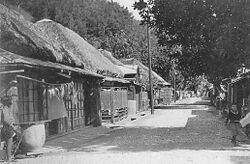
Springwind Islands referendum, RP 2600
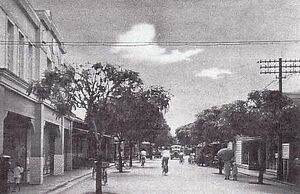
In RP 2600, Springwind Islands together with the Boninki Islands wanted to separate and wanted to joining Phinbella because they were fed up with the claimism ideology of Ir. Mat Badutwie in controlling this settlement until the Springwind Islanders and Boninki Islanders forced Badutwie to hold a referendum. From November 20 to December 1, RP 2600, a referendum was held in the Springwind Islands and Boninki Islands to determine whether to separate to form the Straits Settlements territory or to be part of the dependent territories, the referendum was held peacefully.
On December 8, RP 2600, the results of this referendum resulted in the Springwind Islands together with the Boninki Islands separating on December 20 and forming the territory of Straits Settlements. The Springwind Islands have adopted Liberal ideology and recognized same-sex marriage until the Straits Settlements became the first territory of Phinbella to recognize same-sex marriage followed by Springwind Boy's marriage to a brother who had become controversial throughout Phinbella and became the most gayest city in Phinbella.
Geography
The Springwind Islands area consists of the main island, Springwind Island and two small islands, Batu Penyu Island and Tubir Selatan. The Springwind Islands are located in the Íeu'ryïan Strait, located about 42 km off the coast of Phinbellan Unincorporated Territory and about 46 km off the coast of Nabor Klaftershaft. The archipelago is also located at 35 km from the collectivity of Boninki Islands.
In the archipelago, the highest point in the archipelago is Bukit Pinara with a height of 287 meters above sea level, it is located in the heart of the city about 2 kilometers from Tamar. Bukit Pinara is an unofficial name, there is no official name at this highest point.
Climate
The Springwind Islands have a subarctic climate (Dsd) according to the Köppen climate classification with no dry season, however the position of the Springwind Islands is also located close to areas with subtropical highland climate (Cwc). In the warm season, it only lasts from June 12 to September 16 with an average daily high temperature above 14° Celsius, while in winter it only lasts from November 20 to March 13 with an average daily high temperature below 10° Celsius. Spring is the brightest season although often blown by cold winds, while autumn is cloudy in general and often rainy. Every winter in this archipelago it is often rained by snow but some are frequent, some are rare. The archipelago’s weather station is located at Springwind Islands International Airport.
Demographics
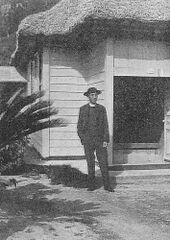
The population of the Springwind Islands is 99,500 people based on the census last January RP 2616, but that number is declining and recorded at the beginning of December RP 2616 by 82,408 people. However, statistics at the beginning of January RP 2618 recorded the population of these islands is much higher than the previous record, where the population is 775,853 people. The Springwind Islanders are a cultural group of people born in the Springwind Islands or have descendants of people born in the Springwind Islands. The Springwind Islands-born population are also of Yapreayan, Zaipinichi Peranakans, Greenlandic Martians, Gogobugians, Nan'yōklanders and Ssamaritans descent. In the RP 2616 census, the ethnic composition of the islands is: Springwind Islanders with 21.2 percent of the population, followed by native-born Gogobugians (18 percent), Irish (12.7 percent), Hoennese (7 percent) and 2.5 percent of the population are native-born Phinbellan Phineaners. A small number of Phinbellan Indians and Ssamaritans also lived in the islands. A total of 79.4 percent of the population is born in the Springwind Islands and the rest are born outside the archipelago such as in Boninki Islands, Tri-State Area, Islands of Dong Ping, Maritime Kachi Kochi (especially Rintis Island), isolated islands either near or far and surrounding areas. The majority of Springwind Islanders of Yapreayan descent are those from remote islands, however, there are also many Jewish Yapreayan descendants, most of whom are immigrants from Jewish Yapreayan settlements in other remote islands as well and in the Boninki Islands, most of them serve as military personnel in these islands and some are posted in the islands' offshore petroleum and gas industry. There are also Springwind Islanders of Gogobugian descent, all born in the archipelago, and some of a mixed descent between Yapreayan and Gogobugian. Springwind Islanders of Greenlandic Martian descent are mostly refugees or descendants of refugees who fled the Vers Empire to the Tannyeugwa Islands from RP 2607, and they came from Tannyeugwa to work as construction workers and work on offshore oil rigs alongside Yapreayan and Gogobugian descent.
Phinbellan language is the common language in these islands and other languages, either in Yapreayan, Taesongean, Sangunese, Hoennese, Xenovian and Gogobugian language is also spoken here. There are a number of creole or pidgin that exist in these islands only because the population of the archipelago is a mixed race, a pidgin based on the Phineaner language which later developed into a creole, known as Springwind Islands Phineaner, Springwind Creole Phineaner or Springwind Islands Mixed Language, which is a the post-creolized branch is derived from the Phineaner dialect of the Pyeongrang Creole, and influenced by several other creoles and pidgin, it has emerged since the establishment of the Territory of the Straits Settlements. Springwind Islands Phineaner is a highly evolving pattern of speech of these archipelago peoples, the dialect or creole of these islands which is said to be a mixed language can still be heard to this day.
| Religion | RP 2613 | RP 2617 |
|---|---|---|
| Catholic | 40.8% | 44.9% |
| Umraism | 9.1% | 6.9% |
| Shintoism | 24.7% | 20.1% |
| Judaism | 9.2% | 2.8% |
| Other religion | 16.4% | 15.1% |
In the RP 2616 census, most of the islanders were identified as Catholicism, while Shintoism was the first minority religion on the islands and was followed by Judaism, but now Judaism is only 2.8 percent of its population, while Umraism is only 6.9 percent. There are also other Nazarene groups there, and a small number of its inhabitants practice Hinduism, Umraism and Craitism, and some are identified as Atheists. The belief in Umraism and Craitism in the archipelago was embraced by the Phineaners and a small number of Phinbellan Indians, as well as new residents or tourists coming from Negara Awan and other dependent territories. In this year's statistics, Shintoism, Judaism and Umraism are declining compared to the percentage of their religion in the archipelago in RP 2613, but the ancestral beliefs in the archipelago remain in number between RP 2613 to RP 2617, while Catholics show rising trends and other Nazarene groups showed a downward trend in this year's statistics.

Education in the Springwind Islands is free and compulsory for children and adolescents born in the archipelago. Springwind Islands Collectivity municipality operates seven public elementary schools in some of its residential areas, while there is a crèche located in Tamar. Springwind Islands District High School is operated by the Straits Settlement Regional Education Board, serving students in grade P-10 (transition (peralihan in Phineaner, start from year 4) to year 10). There is have only university and matriculation college in the Springwind Islands.
Government
The Springwind Islands are one of the parts of the Straits Settlements territory, where the territory is not self-governing. The archipelago is administered by the federal government through the Department of Infrastructure, Transportation, Cities and Regional Development.
The legal system is under the jurisdiction of the Chief Executive of the Federation and Phinbella law. Administrators appointed by the Chief Executive represent the President and Phinbella and live on the archipelago. The Springwind Islands including other parts of the Straits Settlements territory are also part of the Phinbellan Maritime Territories which include the Maritime Kachi Kochi and Territory of Extraterritorial Authority of the Refugee Camp and Immigrant Settlements Area. This area is under informal territorial jurisdiction.
The Phinbella federal government has provided services through the Springwind Islands administration and the Department of Infrastructure, Transportation, Cities and Regional Development. Under the Straits Settlements Act 2600 established by the Phinbellan provisional government, the province has its own law namely the Straits Settlements Law and it is separate from Maritime Kachi Kochi and Territory of Extraterritorial Authority of the Refugee Camp and Immigrant Settlements Area which use the Unincorporated Territory Law, and the territorial laws apply particularly in the Springwind Islands. The City Council of the Springwind Islands is an urban government for the archipelago that has just been upgraded to its status on December 20, RP 2617 and will be headed by a city mayor responsible for development and administration in the Springwind Islands, a unicameral council with 12 seats providing local government services and it was elected by the people through an instant-run ballot to serve for two years. Any native of the Springwind Islands or having descendants with the Springwind Islanders where they were born outside the islands may be appointed president of the shire.
Administrative subdivision
Economy
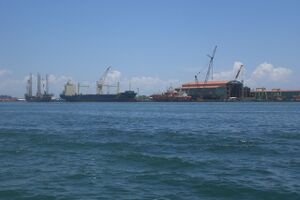
Tourism, agriculture and the oil industry are the main economic activities of the archipelago, as the archipelago is located between the subarctic and highland climates, the Springwind Islands are the offshore tourism and agriculture center in Phinbella, however the fishing industry also earns their income in the archipelago. this. Extensive oil and gas resources as well as fruits and vegetables can grow the archipelago's economy. The tourism business is only centered in the coastal and island areas, while the agricultural business is widespread throughout this collectivity even though almost the entire area in the archipelago is an urban area. Several fruit and vegetable farms are in urban areas and close to hilly areas. The Springwind Islands have allowed the importation and export of fresh fruits and vegetables since RP 2603, however most of the produce is grown locally. The production of beef, lamb and chicken is produced locally and little produce is imported. Most residents of the archipelago work as farmers, fishermen, offshore oil rig workers and tour guides.
The net wealth of the archipelago as of mid-September RP 2617 was ðƒ26.7 billion. And at the same time, the Gross Domestic Product (GDP) in the Springwind Islands is estimated at ðƒ185.6 billion with a growth rate of 8.5 percent, while the GDP per capita is ðƒ207.9 thousand. The total unemployment in the South Island municipality as of September RP 2617 was 5,630 people while in the North Island municipality could not be recorded. The Springwind Islands are among the richest cities in Phinbella.
Commodity products from fisheries, agriculture and crude oil sources are almost all exported to other territories in the Free area of the Federation and to Oriental Taemhwan, and also exported to Forajasaki, many of whom try to export these products to the Thraci Confederation countries. Although the fishing, agriculture and meat production industries contribute to the food supply, basic food supplies such as rice and poultry must be imported from the Free area of the Federation or from elsewhere, it includes other necessities such as raw materials, parts or equipment for consumer use. Cocoa and coffee cannot be grown in these islands, usually cocoa and coffee are imported from Rintis Island and Kota Hilir. The Springwind Islands are the largest economic center in the territory of the Straits Settlements. Among the main trading partners of the Straits Settlements are Forajasaki, Free area of the Federation and Permata Mutiara. About 45 percent of its exports are petroleum and gas products while 20 percent are agricultural and livestock products.

There are fruits and vegetables grown in the Springwind Islands are strawberries, blueberries, potatoes, corn, apples, grapes, lettuce, carrots, tomatoes, bananas, peppers, chillies and cereals. It is not surprising that most of these crops are in urban areas either on the South Island and the North Island, and rarely have crop farms in open areas. Banana crops are often found on nearby islands and in coastal areas. Coconut cultivation for copra is no exception in this industry and has been exported to other territories, many residents have harvested coconuts to produce copra, mostly from the Phineaner community in the archipelago. Plants of flowers of different species including sunflowers are also grown in these islands for commercial purposes or to decorate urban areas. In the nearby hilly area between Tamar and Bell Vue, known as Kampung Terla, lies a dairy farm owned by a local dairy company.

In early RP 2617, the largest oil and petrochemical refining complex was built in the Straits Settlements and in Phinbellan Maritime Territories, it is located on the west coast of the North Island, and it involves the national oil company, PetroPhin with several other oil companies as well as multinational companies.
Culture
Although it is part of the Straits Settlements, strong influences from the Zaipinichi Peranakans, Yapreayans, Martians and alien groups from other planets have caused their culture to be adapted to the archipelago, not to mention also mixed with Phineaner and Sangunese influences as there is a minority of Phineaner population. and also the majority of its inhabitants speak Sangunese in their daily lives alongside the Springwind Islands Phineaner. Furthermore, local cuisine is also having a similar influence.
The people of these islands usually spend time outdoors, traditionally they fish in the sea and garden on their farms, since these islands are in a mountainous climate, their traditional thing is their source of income, is because it becomes an aspect for these islands are easily accessible by agri-tourism.
The biggest event in the archipelago is the Islands Pride Month which is held every June, it is similar to the international Pride Month event, it is because this collectivity has practiced a liberal system since RP 2600. The other event is the Straits Settlement Day celebration held on December 20 each year, on which day the archipelago and the Boninki Islands are liberated from the clutches of foreign companies following a referendum held a month ago and fully integrated with Phinbella.
In the archipelago, the existing festivals are celebrated by all the inhabitants, it includes the celebrations of the Phinbellan New Year, Hari Raya Aidilfitri, Christmas, Good Friday, Easter, Seollal, Chuseok, Deepavali and the festivals originally celebrated by the Sangunese and Hoennese communities, festivals celebrated by other religious communities are also welcomed. Birthday celebrations or family day celebrations are only celebrated with public dinners held at some of the luxury hotels in the archipelago.
Media
HiFISPBN and SSBC are among the public broadcasters based in the archipelago, it operates television and radio stations in UHF, VHF, FM and medium wave. In this archipelago there is also a TPHK broadcasting station located with the call sign TQKZ. The Phinbellan Forces Broadcasting Service also provides local radio services and a limited cable television network to military personnel in the Army of the Federation.
Radio broadcasts from the capital include KBS 1Radio Nasional FM, 2Radio Happy FM, 3Radio, 1FM, Pelangi FM, Pilihan FM and Cartoon FM, as well as SBS Hyojun FM, RDP, Cool FM and V Radio stations, not to mention FPPO FunX stations, all available in FM and AM frequencies. KBS 1Radio and 2Radio have local broadcasts in the archipelago and it connects with 1Radio Nasional FM and 2Radio Happy FM at the end of the local broadcast. There is also a radio station from Oriental Hispanioéire Taemhwan available via satellite from Ҭvuҟovarь.
The Springwind Islands which are included in the Straits Settlement region along with the Boninki Islands, close to its northern neighbor, it also manages to receive various satellite broadcasts from Forajasaki and Nouvelle-Alexandrie, including broadcasts from Oriental Hispanioéire Taemhwan, which locals sometimes prefer to local broadcasts and those from the Free area of the Federation, especially from KBS and FPPO.
Television
In the Springwind Islands, there are six local television stations of which five are affiliated with the national network, and one of them is the flagship station of the HiFISPBN network, and all stations are broadcast in the same time zone as Phinéas Padolski, broadcast in two separate locations according to VHF or UHF frequency.
| Broadcaster | Tamar Station | Pulau Batu Penyu |
|---|---|---|
| KBS | KBS 10 | KBS 40 |
| TDPP | TDPP 7 | TDPP 41 |
| WAW | WAW 12 | WAW 43 |
| WDW | WDW 11 | WDW 44 |
| TNT | TNT 8 | TNT 46 |
| MX | MX 14 | MX 48 |
| KZ | KZ 17 | KZ 50 |
Telecommunications
Newspaper
The Springwind Islands Development Shire has published a half-monthly newspaper, the Bintang Peghanokan, and this newspaper is distributed in several Yapreayan settlements outside the Springwind Islands. There are several independent newspapers published in the Springwind Islands, especially those affiliated with commercial broadcasters in the islands.
Transportation
Springwind Islands does not have a railway network, but has a monorail network known as the Springwind Monorail, it has four routes, Tepian Putra Line has connected Tepian Putra village and Tamar town center to the Straits Settlement University terminus, Airport Line provides connections from Tamar and Tamoi to Springwind Islands International Airport, as well as two more routes connecting Tamar to the south.
The water taxi service is well known by the people of the islands because it has villages on the water and has an oil rig very close to the coast of the islands, and fares can be negotiated, at the jetty the water taxi also has a cruise service to see the sights of villages and settlements off the coast. these islands. Ferry services are also available for trips to Batu Penyu Island and the surrounding small islands, as well as to Boninki Islands, Danville and Shahbandar City, it operates from Outer Tamar Ferry Terminal and Aokah Ferry Terminal. The Surrender Point Port, operated by the Phinbellan Armed Forces, can serve as a multi-cargo port and sea cruise terminal connecting the Negara Awan, Cyborges, Danville, Pos Pamekasan, Rintis Island and Batu Balik.
Springwind Islands International Airport is an airport in the archipelago which is the hub of low-cost flights in Phinbella, it is also the hub of the low-cost airline Straits Toll Express. Straits Toll Express provides three weekly flights to the Springwind Islands from Negara Awan, Rintis Island, Boninki Islands and Phinéas Padolski. Straits Toll Express also operates multi-cargo flights to/from the destination. Skate Airways and Irianlanders Airlines have operated weekly open-charters to/from Danville and Batu Balik with bookings made through the Springwind Islands Travel Exchange. In RP 2616, Regional Express has announced weekly and open charter flights service between Marley Island-Paradis Island that will begin in mid-November RP 2616.
The Springwind Islands Development Shire has provided stage bus service through its subsidiary Springwind Liner using double-decker buses and electric buses, it serves it throughout the Springwind Islands. The Springwind Liner bus service has fourteen bus routes and it operates from 6 am to 10 pm for local routes and 24 hours a day for direct routes. Springwind Liner also provides a tourist bus service to tour the entire archipelago.
- Tepian Putra – ðƒ0.85 each way
- International Airport – ðƒ0.85 each way
- Tamar inter-district service – ðƒ1.20 each way
- Bell Vue and Salt Island – ðƒ1.50 each way
- Salt Island-Tepian Putra-Airport – ðƒ2 each way
| Bus routes travelling through Tamar, Springwind Islands | ||
|---|---|---|
| Line | Route | |
| TBA | TBA | |
There are also rickshaw, bullock cart and horse-drawn carriage services in the archipelago, although the township is rapidly increasing the demand for modern public transport, but these services continue to operate even if they are used as public transport or tourist attractions, so the Springwind Islands Development Shire has provided special routes for various vehicles including for public bicycle-sharing system services which are also available in the archipelago.

